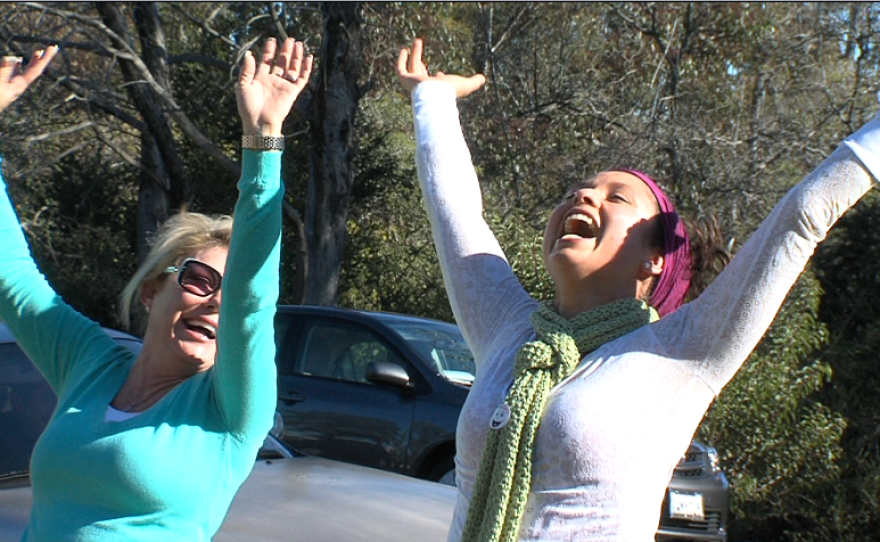A group of people are gathered on a Saturday morning in Balboa Park to laugh hysterically. But there's no comedy show in town, no knock knock joke convention and no mind-altering substances have been imbibed.
Instead, these people are practicing what they call Laughter Yoga. The exercise has very little traditional yoga and a lot of laughing, but the participants don’t seem to mind. They take pretend laughter pills, tell jokes in gibberish, howl at each other and lie on a tarp on the ground, all to encourage themselves—and each other—to laugh.
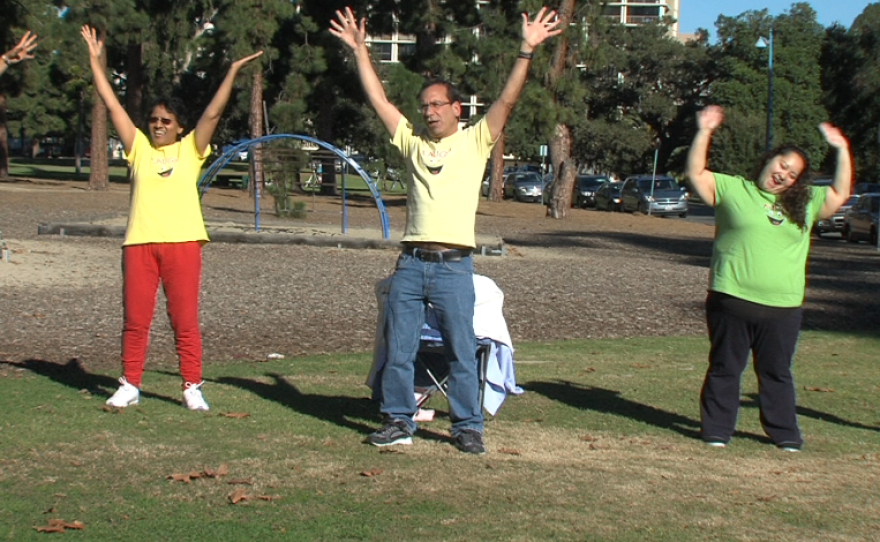
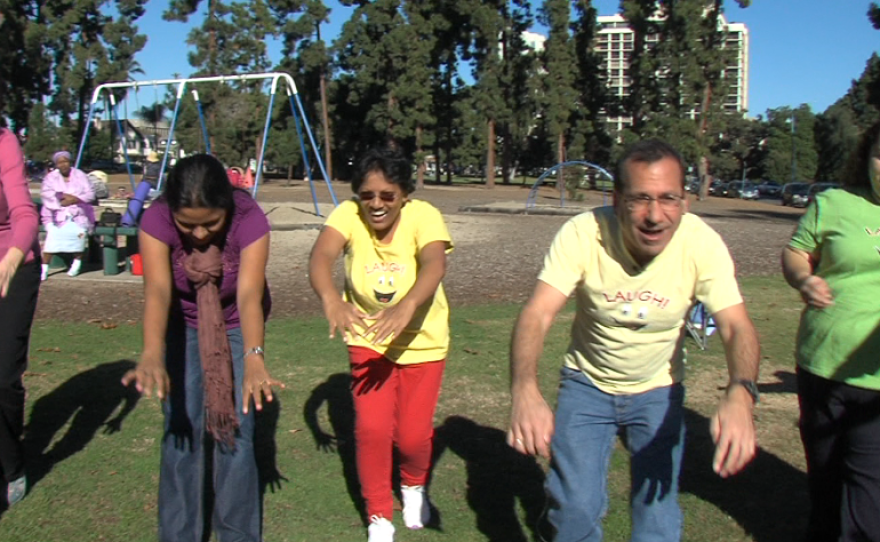
And it works. It would take a very strong-willed stone-faced grouch to watch their antics and not at the very least crack a smile.
Laughter yoga participants say the activity reduces stress, improves their mood and is good for the lungs and immune system. They also use it in conflict resolution and therapy.
Michael Coleman stands in front of the group wearing a yellow t-shirt decorated with a smiley face and the word "LAUGH!"
“Pinch your cheeks and say I’m so cute, I’m so cute, I’m so cute!” he instructs.
Believe it or not, Coleman is a lawyer. But he also leads laughter yoga classes and started a nonprofit called Laughter Matters to bring laughter exercises to the elderly, homeless and people with mental illness and drug and alcohol problems. Whatever your problem, Coleman says laughing can help.
“Sometimes we’ll say, ‘work is so stressful, I don’t think I can make my deadline,’ but, hahaha," Coleman said while, of course, laughing. "And then we laugh and then we say the good thing is, 'I always do make my deadline, or I can laugh about it.'”
Laughter yoga was first started in 1995 by Madan Kataria, a doctor in India (or "The Guru of Giggling," as he's now known). Kataria was convinced of the medical benefits of laughter, so he started a laughter club. A small group of people gathered in a park, told jokes and laughed. Problem is, the jokes quickly became mean or vulgar.
“I said, ok, we will stop telling jokes, but we will laugh without jokes," Kataria said. "They said, how?”
Kataria decided they would fake their laughter, because he believes the body can’t tell the difference between fake and real laughing. And he found after a few minutes of fake laughing, everyone started laughing for real.
Because his wife is a yoga teacher, he combined his laughter practice with yoga. Laughter Yoga was born.
Now San Diego has one of the biggest laughter yoga communities in the country. Coleman’s nonprofit has trained 80 people who lead hundreds of classes.
One of them is Jesalyn Eatchel. She brought laughter yoga to her job as a therapist for a youth program at Sharp Mesa Vista in City Heights. The teenagers and young adults there struggle with depression, bipolar disorder and schizophrenia.
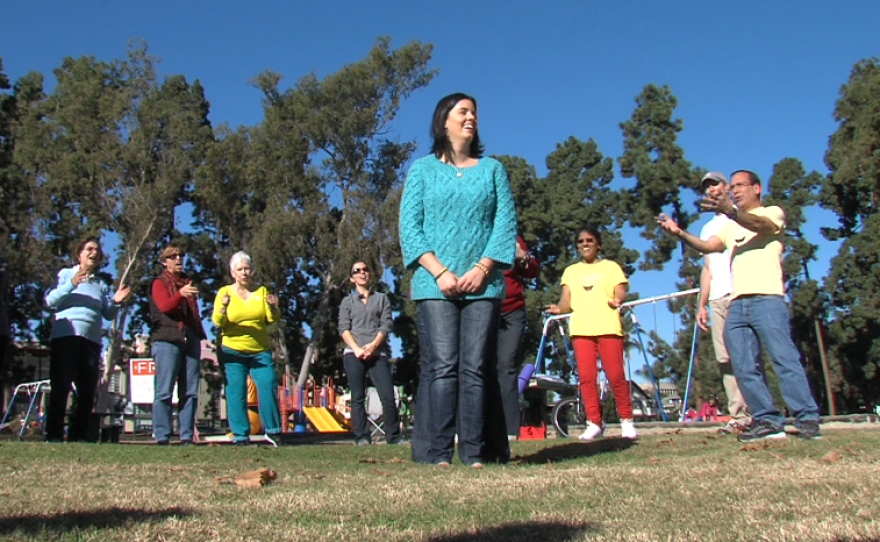
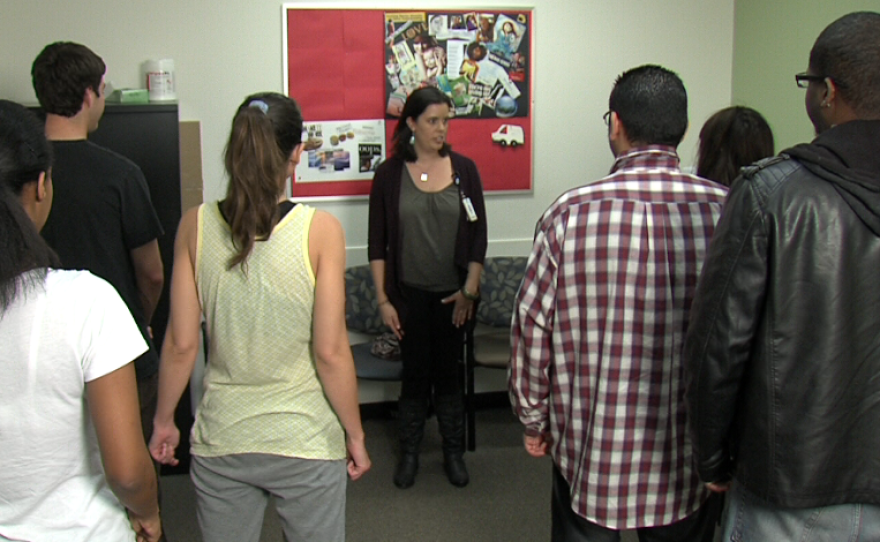
“We had one client in particular who said that during the time we were doing laughter yoga, that they didn’t have any voices,” Eatchel said.
It might seem like too much to ask people who are dealing with significant challenges to just laugh. But Eatchel said sometimes that simple relief is necessary.
“It doesn’t mean that our stressors aren’t real," she said. "It doesn’t mean that what you’re going through is not hard, it doesn’t mean that we’re making light of it at all. What we’re doing is just allowing there to be some lightness.”
On a recent afternoon, six young adults gathered for Eatchel's laughter yoga class in a small conference room at Sharp Mesa Vista.
“Inhale up, and on the way down, laugh," Eatchel instructed.
They reached up their arms and then bent over, laughing heartily as their heads fell. One girl dressed in sweatpants and a yellow tank top jiggled her legs nervously as she watched Eatchel teach, but let out loud, boisterous laughs each time her turn came.
Eatchel said when she first started the class, she expected teenagers to act too cool to laugh hysterically for no reason. But they surprised her by enthusiastically joining in.
“It’s ok to let there be lightness on a dark time in their life, because we talk often about how it won’t always be like this," Eatchel said.
Coleman said there are a few times when laughter isn’t appropriate. But, he said, those times are very rare.
“If I came home and my house is on fire, my initial reaction, I mean, I might go, hahaha, but if there’s someone in the house you want to get them out,” he said.
Coleman hopes to bring laughter yoga to even more places, like corporate retreats, couples therapy, even the area where he works: landlord-tenant relations and post-foreclosure evictions.
“I’ve thought about bringing it to divorce, family law," he said. "If we get the husbands and wives, or whoever’s on either side to laugh separately, in groups, before they get together to talk about conflict resolution. Laughter Yoga is wonderful for conflict resolution I think.”
He may be right. After all, as the song says, "don't you know everyone wants to laugh?"

